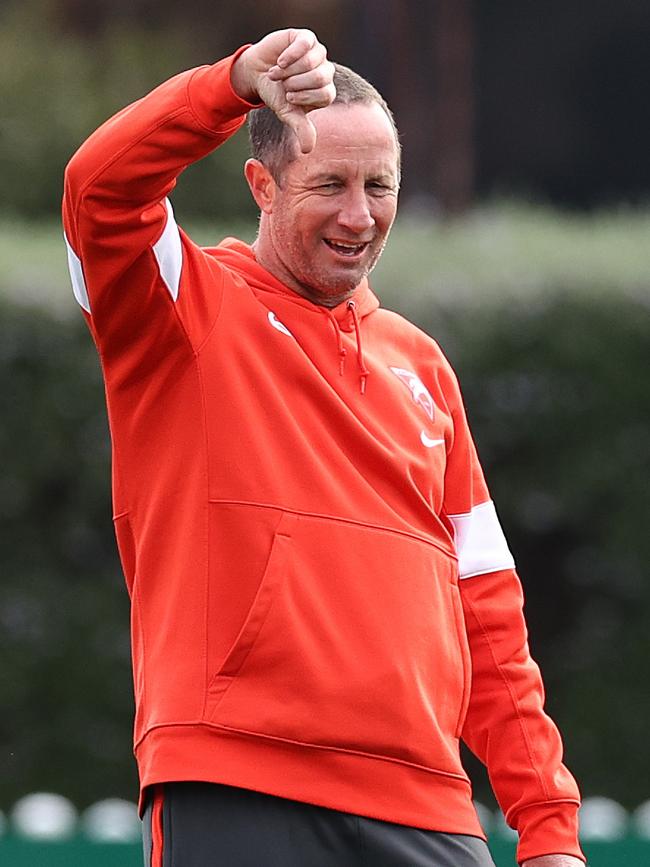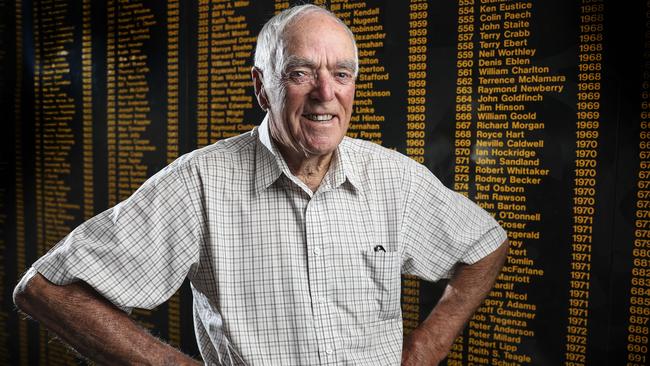‘Unsocial’ media undermines AFL stand against domestic violence | Graham Cornes
The AFL’s overdue stand on domestic violence will be held back by an anti-social modern problem, writes Graham Cornes.
Sport
Don't miss out on the headlines from Sport. Followed categories will be added to My News.
It is incredible that the AFL took such a long time to take a public stance on domestic violence.
Had it not been for Don Pyke, the now West Coast Eagles chief executive, the country’s biggest and most powerful sporting organisation might still be a passive observer.
A sympathetic one perhaps, but nevertheless only an observer to the crisis of gender-based violence that is afflicting the nation.

Too many women have been killed by an abusive partner. Unless the tragedy impacts directly on us, too many of us can’t believe that is a national crisis.
Pyke has always been more than just a footballer.
Yes, he was a premiership player and best and fairest winner with the Eagles, but he also had significant success in the corporate world before taking on the one of football’s toughest gigs – coaching the Adelaide Crows.
What might have been.
He was just three quarters away from winning the Crows third premiership.
But fate and Dustin Martin intervened and Richmond overran the Crows in the last three quarters of the 2017 grand final.
Rarely has the fallout from a grand final loss been as dramatic. Eventually Pyke, his assistant Scott Camporeale, and high-performance manager, Brett Burton were hounded from the game by a hostile media fuelled barrage of half-truths, rumour and innuendo.
But he maintained his dignity and integrity and slowly worked his way back into football, first as an assistant coach at Sydney and now as the chief executive at West Coast.
After plummeting to the bottom of the ladder, the Eagles are slowly rebuilding and Pyke is a significant part in the rebuild.
Pyke could have ignored the scourge of domestic violence and turned a blind eye, but his social conscience is still undaunted.
He chose to lead on an issue that most are hesitant to address.
He saw the massive crowds across Australia that rallied in protest against the number of women who have suffered and lost at the hands of a violent partner.
So he wrote to the AFL encouraging it to take a public stance. The clubs who were copied into the correspondence unanimously agreed.
So last week the players from both sides and the umpires met in the centre of the ground, linked arms and stood in a minute’s silence.
Then they played.
I wonder if they felt or understood the real impact of the message?
At least they were thinking about it. At least the AFL has been forced to confront the issue.
The domestic violence charges against North Melbourne player Tarryn Thomas have been widely publicised.
His contract with the Kangaroos was terminated earlier this year after the AFL imposed an 18-match suspension when its integrity unit found he had “engaged in multiple acts of misconduct, including threatening a woman via direct messages multiple times”.
His return to AFL football had never been completely ruled out.
Essendon coach Brad Scott, who had coached Thomas previously, faced a pile-on of media and social media criticism when he suggested that Thomas’s AFL career was not yet over.
“I’ve known Tarryn since he was 14 and in my view he’s a good person,” Scott said on Channel 7.
“Has he made some terrible mistakes? Yes he has, and he’s the first to admit that.”
Scott may be right.
Coaches always look to redeem fallen characters and look for their positive attributes to outweigh the negatives.
Occasionally they succeed but rarely does the leopard change its spots.
Thomas’s chances of redemption seem even more remote now further allegations of harassment and police involvement have emerged this week.

Then a North Melbourne email was released that further condemned Thomas and effectively ended any chance of playing again at the AFL level.
“We eventually found a combination of programs for Tarryn. Even though Tarryn ended up completing four different programs which included an extensive combination of education, therapy and participation-style programs, we were not able to change his behaviour”, wrote North chief executive Jennifer Watt, in an email that was circulated to other clubs.
Whether it is kicking man while he is down or informing prospective employers of his flaws can be debated, but who will take a chance on offering him contract now?
Tarryn Thomas’s AFL career is over. One fears for his future.
Many of us think, in this the 21st century of gender-equality and equal opportunity, that domestic violence has been effectively addressed.
Women have a voice and young men are well-educated about abusive behaviour to women. That is why it was so distressing to read about the behaviour of male students at the Yarra Valley Grammar School in Victoria, who compiled and distributed photographs accompanied with degrading sexist comments about female classmates.
Following the understandable outrage, the students were expelled but how did it come to this?
Professor Michael Flood of the Queensland University of Technology went some way to explain it when he spoke at a Gippsland Women’s Health Conference held in response to the escalation of domestic violence.
As reported by ABC Gippsland, Professor Flood said: “Men over-estimate other men’s comfort with sexism and violence … men learn this stuff through sport.
“It’s OK to pressure someone into sex – to be the dominant one in the relationship.”
Anyone who has spent a sporting life in a locker room would feel uncomfortable reading those comments.

Professor Flood also spoke about “parental modelling” and “violence in the home”.
In a male-dominated era when the coach was the only male within a football club that players connected with, our Glenelg coach of the day, Neil Kerley was alerted that one of his players had been physically abusive to his wife.
He sat him down and in no uncertain terms explained how unacceptable that was and how he needed to change.
But who knows the circumstances in which the player had grown up?
His father was of the generation that had served in World War II.
It was a time after which mental health issues like post-traumatic stress disorder had not been diagnosed and domestic violence was common in the suburbs.
Was it learned behaviour?
Neil’s “chat” didn’t save the player’s marriage which broke up several years later, but it did send the message that the locker room was not insensitive and such behaviour would not be tolerated.
But that was over 50 years ago.
The ugly statistics tell us that the problem is still as great as ever.
Don Pyke, the AFL and ongoing education might begin to make a difference but in this writer’s opinion, when social media platforms can display so much “unsocial” and inappropriate content, we are fighting a losing battle.
Originally published as ‘Unsocial’ media undermines AFL stand against domestic violence | Graham Cornes





